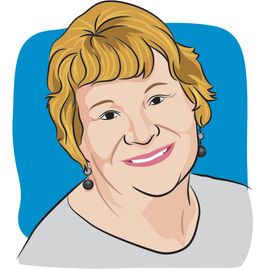- About Us
- Advertise / Support
- Editorial Board
- Contact Us
- CancerNetwork.com
- TargetedOnc.com
- OncLive.com
- OncNursingNews.com
- Terms & Conditions
- Privacy
- Do Not Sell My Information
- Washington My Health My Data
© 2025 MJH Life Sciences™ and CURE - Oncology & Cancer News for Patients & Caregivers. All rights reserved.
Being Vulnerable With Cancer Is OK

Jane Biehl is a 12-year survivor of a very rare form of blood cancer, known as myelodysplastic syndrome (MDS). She has enjoyed several exciting careers including a librarian, counselor, teacher, and writer. She loves to write about surviving cancer, overcoming hearing loss and the wonderful benefits of having a hearing-ear service dog.
I was incredibly naïve about cancer until I was diagnosed with myelodysplastic syndrome. Previously, I had believed that cancer was treated by surgery, radiation or chemo. The patient went into remission once the treatments were finished, and was done unless the cancer returned.
A blood cancer is decidedly different. With MDS, since the cancer cells are transmitted in the blood, the patient is on permanent chemo until it no longer works. Even if the bloodwork shows remission, the chemo must be continued and can never be stopped. It feels like a life sentence when the oncologist informs you that you will never be off the chemo. Every time you enter the cancer center, you know that there is no end and you will be doing this for the rest of your life.
One of the most frequent questions I get from people is, “How long will you be on chemo? Imagine their shock when you say “Never.”
I have been on the roller coaster of oral chemo, invasive chemo with horrible painful shots, bone marrow biopsies and all the terrible side effects for seven years. I have been forced to quit two part-time jobs I loved because of the fatigue and exposure to infections. But how does one handle the whole ordeal? How do you balance the doctor visits, the biopsies, the side effects and the constant fatigue that never goes away? Your life changes drastically when you realize you will never feel as good as you did before your cancer. I had decided from the get go I was not going to complain. I was going to be an example of being positive, happy and thankful to be alive, which I am. BUT — what I did have to learn was to be vulnerable. And what a lesson it has been for me.
After a particularly tough time of having intestinal flu, hurting from the horrible chemo shots, battling the grayness of Ohio winter, and sleeping many hours away, I decided to reach out. I live alone and am very independent. I am fortunate to have many friends all over the world I keep in touch with on Facebook. After much deliberation, I wrote what was really in my heart. I explained that I was tired, sad and discouraged. I emphasized that I did not want to be a whiner and felt fortunate to be alive. I acknowledged that there were people much worse off than I am. Still, I asked for support and prayers to help me through this terrible time. The response brought me to tears. Within hours, I had comments from people in Japan, Holland and all over the United States. I heard from friends and neighbors nearby who I seldom see. I got messages from students at the community college where I used to teach. Overwhelmingly, people told me that I was not a whiner. They thanked me for asking for help. They assured me that I was in their thoughts and prayers. A couple of people thanked me for breaking the facade and “being real!” People reassured me that I was strong and would get through this. They offered to come and help me with food, cleaning and even walking my service dog when I was too tired.
The very post that I was afraid to write because I would appear weak and babyish had the opposite effect. People responded with support and love and told me that I was being strong in asking for help. It is OK to be upset and depressed. It is alright to be vulnerable and ask for help when you need it. Most people want to help the cancer survivor and we need to tell them how. So — if things are not going well, if you feel terrible, if you need someone to talk to or walk the dog, tell your friends and family. If you are religious, ask for prayers. Most of the people in this world do want to help and care. You have to let them know what you need and let them assist you. They know you would do the same for them and others.
Amen.
Related Content:



